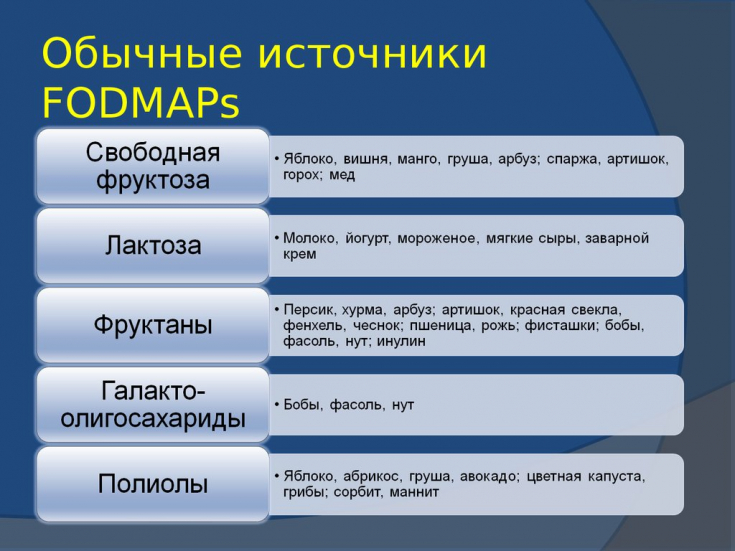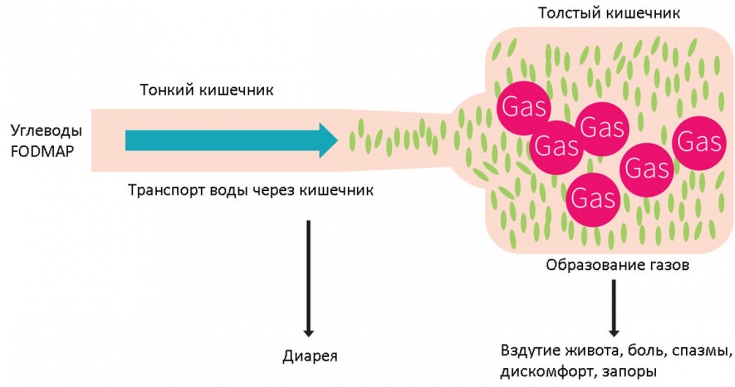For stomach problems that occur despite proper nutrition and a healthy lifestyle, gluten has traditionally been the prime suspect. But in the case of irritable bowel syndrome, this protein found in many grains has an accomplice: carbohydrates are suspect.
estet-portal.com. will talk about why this happens, as well as share the secrets of FODMAP - an increasingly popular for irritable bowel syndrome.
- Irritable Bowel Syndrome and Nutrition
- What is FODMAP and how to use it
- What you need to know before starting the FODMAP diet
Irritable Bowel Syndrome and Nutrition
IBS (irritable bowel syndrome) – thing is extremely annoying. Those suffering from this disease sometimes get the impression that the stomach reacts to any food, at best, with dissatisfied grumbling, at worst – a real storm: diarrhea or constipation, bloating, flatus, cramps, colic… Wikipedia explains this disease "disturbances in the behavior of the intestines in the absence of any organic causes".
Read: Effective Treatments for Irritable Bowel
It's a shame: there is no reason, there is trouble. Although they talk about the influence of stress (I wonder if there is at least one disease in which he is not to blame?), Taking antibiotics, malnutrition with a lack of fiber, infections of the digestive tract, poisoning. However, this is not about causes, but about consequences and how to get rid of them.
Subscribe to our page on Instagram!
It is believed that IBS affects between 8 and 20% of the world's population. That is almost one in five! And 2/3 of them – women (probably stress is to blame…).
It is not surprising that specialists, tired of prescribing pills that rarely solve the problem once and for all, began to look for another method of dealing with the malignant syndrome. And found. It's called the FODMAP diet.
What is FODMAP and how to use it
An unusual acronym was born at Melbourne Monash University (Australia). It consists of the initial letters of the word "fermentable"; and the names of carbohydrates that are poorly and incompletely absorbed in the small intestine, which leads to increased gas formation. The organisms of that long-suffering fifth of the population are not able to cope with the digestion of certain carbohydrates.
Read: Irritable Bowel Syndrome - when the stomach hurts due to stress
Carbohydrates that are not properly digested from the small intestine enter the large intestine, where, under the influence of the bacteria living there, they undergo rapid fermentation. It is during the fermentation process that gases are produced that cause discomfort, bloating and pain.
Subscribe to our page on Facebook!

It happens that IBS is paired with fructose and lactose intolerance, so foods containing them are also excluded from the FODMAP diet. Research by Dr. Peter Gibson, one of the Australian "parents" FODMAP diets testify to the effectiveness of his offspring: the diet relieves the symptoms of IBS in 70% of patients!
Irritable bowel syndrome suffers, according to various estimates, from 8 to 20% of the world's population. 2/3 of them are women. FODMAP diet in IBS saves 70% of patients from unpleasant symptoms.
What you need to know before starting a FODMAP diet
Before you switch to a FODMAP diet, you need to consider the following nuances:
- it would not be superfluous to consult with a gastroenterologist or nutritionist (however, this rule applies to any diet);
- The diet is suitable for those suffering not only from IBS, but also from indigestion, functional digestive diseases, SIBO (Small Intestinal Bacterial Overgrowth Syndrome), fibromyalgia and some autoimmune diseases (Crohn's disease, multiple sclerosis, rheumatoid arthritis, etc.);
- you need to switch to a diet gradually (removing more and more products from the "Stop List" from the diet day after day) and follow it strictly. You also need to carefully exit the diet, introducing foods one at a time and observing the reaction of the body. If there is an unambiguously negative reaction, then it is better not to eat such food at all;
- The FODMAP diet excludes a lot of healthy food, so it is not a lifelong diet. According to its principles, you need to eat no more than 1.5 – 2 months, then switch to a normal but healthy diet;
- As for the fruits and berries allowed in the diet for IBS, you can eat no more than one fruit or a handful of berries at one sitting.

FODMAP Diet Stop List
The IBS diet involves excluding the following foods from the menu for a while:
- vegetables: avocados, artichokes, Brussels sprouts, white cabbage (including sauerkraut), legumes (beans, peas, chickpeas, beans), broccoli, mushrooms, onions, beets, asparagus, cauliflower, garlic;
- fruits and berries: apricots, watermelons, cherries, pomegranates, grapefruit, pears, mangoes, nectarines, peaches, plums, persimmons, cherries, apples;
- meat and fish: semi-finished products, refined products;
- cereals: wheat, rye, barley;
- nuts (peanuts, cashews, pistachios), dried fruits, canned fruits;
- dairy products: soft cheeses and all dairy products except those that do not contain lactose;
- sugar-containing products, sweeteners: corn syrup, honey, sugar alcohols (xylitol, maltitol, sorbitol…), agave syrup, fructose;
- drinks: carbonated drinks, whey, alcohol, strong tea (including chamomile), fruit juices.

Adhering to a diet for IBS should be no more than 1.5 – 2 months, then switch to a normal but healthy diet, introducing previously excluded foods one at a time and observing the reaction of the stomach.
What does the IBS diet allow
- vegetables: eggplant, sweet potato, bell pepper, ginger, lettuce, zucchini, potatoes, carrots, olives, cucumbers, tomatoes, parsley, sprouts, radishes, green beans, pumpkin, spinach;
- fruits and berries: pineapple, oranges, bananas, grapes, blueberries, melons, kiwi, strawberries, cranberries, lemons, raspberries, tangerines, papaya, rhubarb, blueberries;
- meat: poultry (chicken, turkey), lean meat;
- fish, seafood: seaweed, freshly cooked fish;
- eggs;
- cereals, cereals: gluten-free pastries, buckwheat, corn, oatmeal, millet, rice, sago, sorghum;
- nuts: all except pistachios, peanuts and cashews, but in small quantities, sunflower seeds and pumpkin seeds;
- dairy products: aged cheeses and lactose-free dairy products;
- fats: vegetable (especially olive) oils are preferred, butter in small quantities;
- sugar-containing products: glucose, maple syrup, stevia, sugar (in limited quantities), chocolate (dark and milk);
- drinks: green, as well as weak black, mint and fruit teas, almond, oat, soy, rice milk.
And remember, exercise will help with a lot of bowel problems.
More useful information on our channel in Youtube:






Add a comment